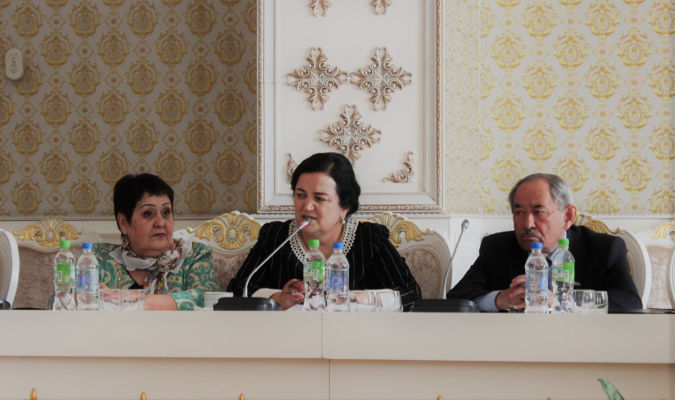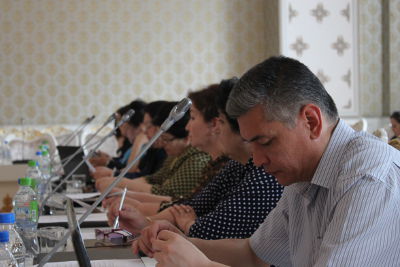Calls for coordinated, gender-sensitive strategy for migrants in Tajikistan
At a Government of Tajikistan and UN Women event, government and civil society partners called for a coordinated, gender-sensitive response to protect Tajikistan’s growing number of women migrants.Date:

At a recent round table in Dushanbe, participants urged coordinated efforts between Government agencies, lawmakers, NGOs and international organisations to create a new gender-sensitive national strategy on labour migration that includes Tajiks working abroad.
Held on 3 May, the round table was organised by the Government of Tajikistan’s Committee for Women and Family (CWFA), with support from UN Women. Representing Tajikistan Parliament, Gafforov Abdukhalim from the committee on social issues, family and health, together with government agencies, NGOs, and public organizations discussed how Tajikistan’s current migration processes affect women and migrant women, and recommended ways to regulate and protect migrant women’s rights.
Each year, nearly 1.5 million Tajik citizens, go abroad to find work. Most are men; many never return, abandoning their wives and families. Despite strong efforts by the Government, Tajik migrants and their families face many difficulties, both home and abroad.
Left-behind or abandoned migrants’ wives become heads of households, solely responsible for generating family income – despite limited access to education, resources, micro-credit, social protection or employment.

National gender expert Viloyat Mirzoeva suggested that Parliament, the State, non-state and the donor community create a special inter-agency working group to draft and implement a new gender-sensitive national strategy on labour migration that included migrant Tajiks working abroad.
Nodira Abdullaeva, UN Human Rights Committee (HRC) Coordinator on migration programmes, also called for the drafting of a new national strategy on labour migration.
Gender- based discrimination in migration policies continues to limit women’s access to safe and orderly migration pathways and limits their job opportunities in transit and host countries. Many migrant women end up in informal employment, particularly in the care and domestic and agriculture sectors.
Javohir Akobirova, CWFA gender department Head, detailed joint efforts made with NGOs, UN Women and other donors to assist migrant women and their families, among them the setting up by CWFA, the Ministry of Justice and Prosecutor’ Office of three working groups to improve gender-sensitive legislation.
Informal domestic or rural sector jobs offer few labour protections and expose migrant women to severe forms of human rights violations that often occur inside homes or in remote locations where victims are unseen and unprotected.
Noting the growing numbers of migrant women in Tajikistan, CWFA head Kosimzoda Idigul Tago urged coordinated efforts to solve the many issues affecting migrant women and their families.
Along the migration trajectory and particularly if using irregular migratory channels, migrant women and girls also face increased risks of sexual and gender-based violence.
After outlining steps taken by their agency to solve migration-related issues, representatives from the Ministry of Labour, Migration and Employment, Office of the Ombudsman, Ministry of Internal Affairs, the State Statistics Agency recommended measures to assist migrant women and their families – including improving legislation and the performance of local police officers, more effective dissemination of information about migration policies, closing existing gaps related to the health and education of migrant women, and the dissemination of best practices to address migrant women’s issues.
The association Women and Society, UN Women NGO partner, detailed practical steps taken to socially mobilise women from migrant families within the UN Women Regional Migration Programme for Central Asia, which worked with Central Asian states to develop laws and policies that comply with international labour migration treaties and human rights commitments and standards.
Funded with the support of the UK Government, the Programme offered Central Asian labour migrants, their wives and families a wide range of gender-specific counselling, information and legal services.
Migration at a glance:
- By 2050, the global number of migrants is expected to reach 405 million
- The great majority of migrants do not migrate across borders - much larger numbers migrate within countries(World Migration Report 2018)
- Children, women and families are making up an Increasing share of migrants, with men making up 52% of migrants and women 48%
- Men and women migrants have different needs and seed different social integration and human development opportunities in their destination country
- Both male and female migrant workers from Central Asian republics are vulnerable to exploitation and abuse, particularly within informal employment sectors such as construction, agricultural and domestic work.